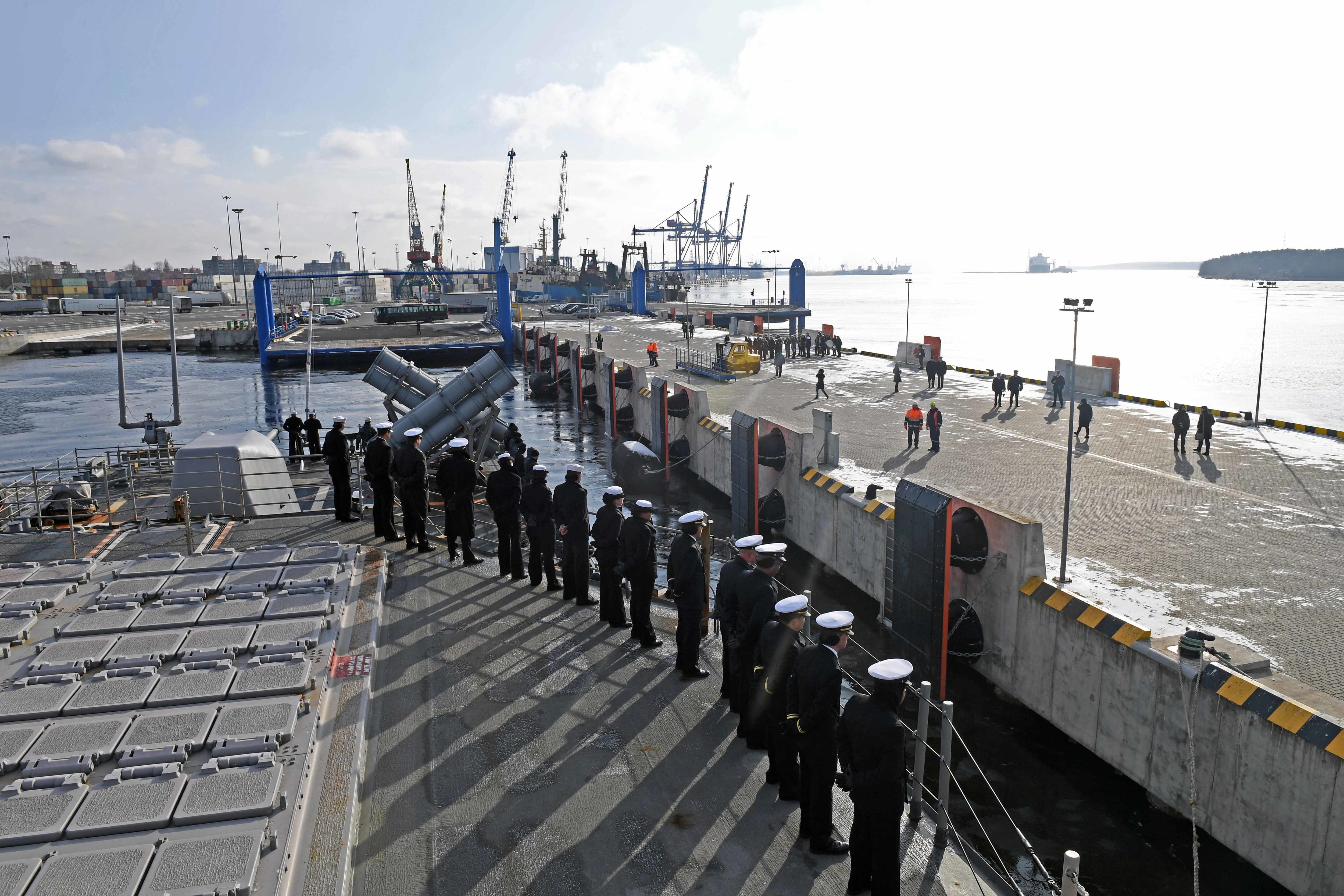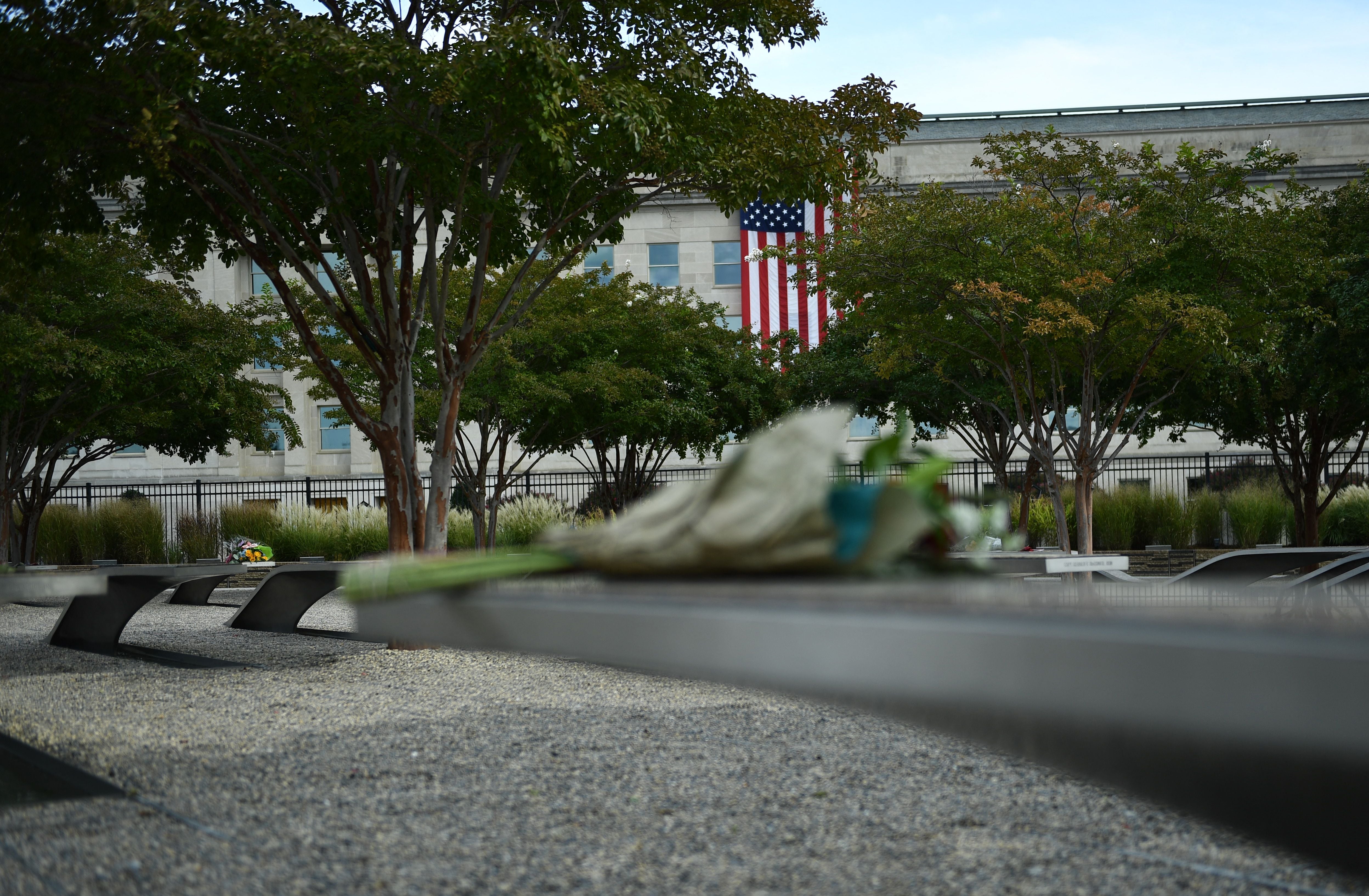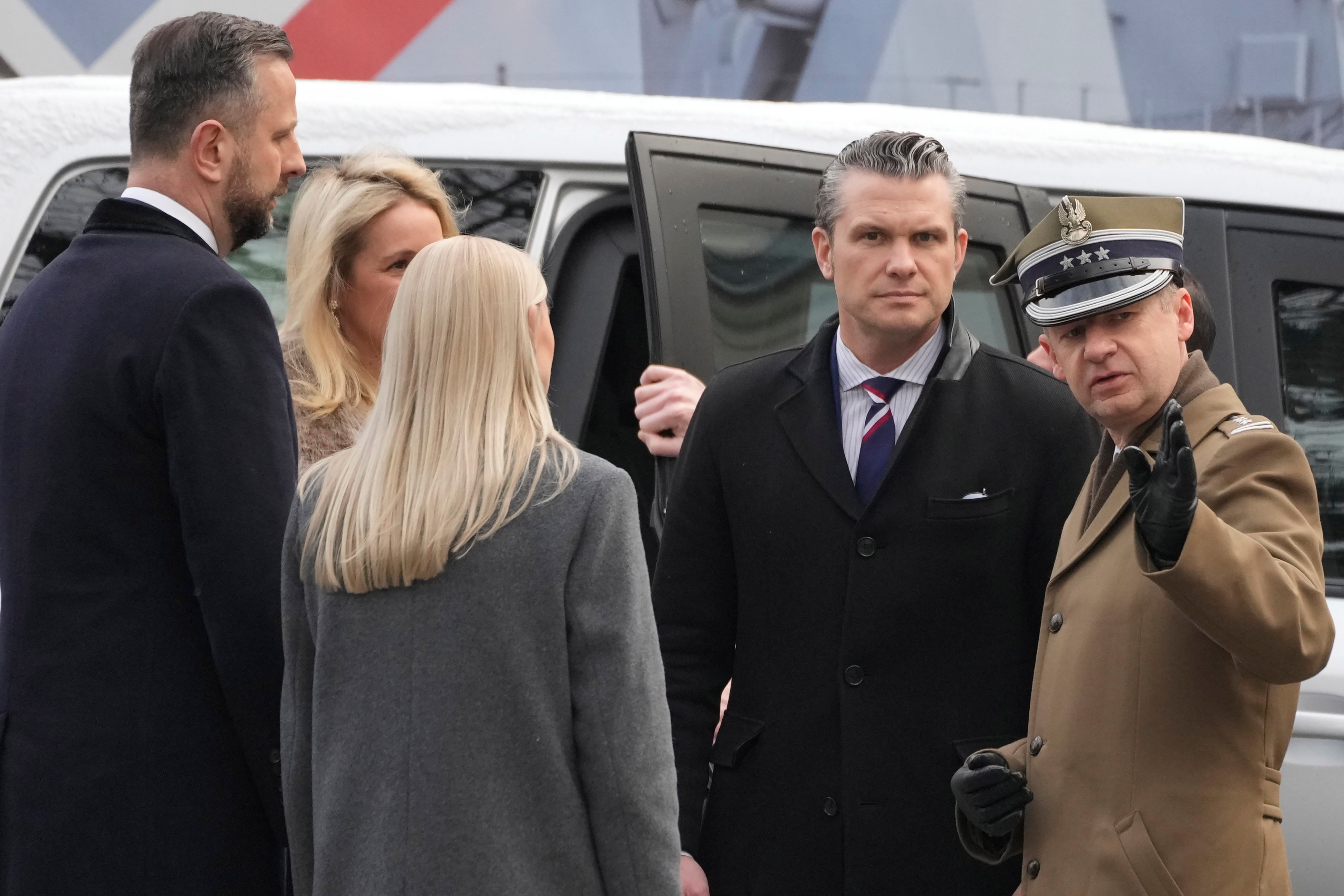A sex scandal sunk six senior enlisted sailors
The decimation of the Hue City chiefs mess began back in February when scores of sailors trundled off the cruiser in the Lithuanian port town of Klaipeda, ready to blow off some steam.
That night would culminate in a drunk chief sonar technician, or STGC, having sex with a junior sailor in a senior chief’s hotel room.
The indiscretion would simmer among the crew for months before eventually torpedoing the careers of the STGC and four other chiefs who were accused of failing to report the fraternization.
Now, two of the accused chiefs are pushing back against the charges of failure to report, claiming to have had no knowledge of fraternization and insisting that their expulsion from the ship — and possibly the Navy — stemmed from a caustic mix of command reprisal and racist favoritism.
RELATED
Chiefs mess meltdown
But back in early February, the visit to Lithuania started like many other port calls: A senior chief got himself a hotel room and took a welcome break from the cruiser’s close quarters.
He invited the STGC and three other chiefs over to hang out before the khakis made their way to a nearby Irish pub.
Surrounded by other sailors, the STGC got drunk and chatted up a female petty officer second class.
“The topic of having sex came up,” the STGC later recalled in an official statement. “We talked a little bit more and I stated that I had access to a room and we can go there.”
The female sailor said in a statement that it seemed like no big deal.
“He assured me that everything was going to be cool,” the E-5 said.
It turned out to be anything but.
The Lithuanian sexcapade between the STGC and the younger enlisted sailor ensnared the majority of seven Hue City chiefs disciplined this spring in a sprawling, ship-wide scandal that took out roughly a quarter of the ship’s chiefs mess, according to records obtained by Navy Times.
A sixth chief was disciplined for having sex with the same female E-5 sailor on a separate occasion, and the seventh was busted in April on charges of drunk and disorderly and disrespecting an officer, according to Navy officials and records.
The details of the Lithuanian port call came to light after two of the chiefs punished for failing to report fraternization — a senior chief and chief boatswain’s mate, or BMC — provided Navy Times with captain’s mast transcripts, statements and other documents.
They offer for the first time a look into the Hue City’s chiefs mess meltdown, and how the command responded.
At least five of the punished chiefs, including the senior chief and the BMC, face administrative separation from the Navy in connection to the misconduct, according to separation notices dated in May and June.
The senior chief and BMC have opted to go in front of an administrative separation board.
Naval Surface Force Atlantic officials would not confirm the details that led to the punishments, nor would they identify the chiefs. The Navy generally declines to disclose the names of sailors who face non-judicial punishment, such as captain’s mast hearings.
The senior chief and the BMC requested anonymity due to the ongoing nature of their proceedings.
The senior chief came to the Hue City in September, and said he witnessed a sloppy culture built on favoritism and racism.
The Lithuanian hookup, he said, spoke to the ship climate the STGC came from.
The E-5 who slept with the STGC in Lithuania said in an official statement that she did not realize she had done anything wrong because “no one else got in trouble for dating and being with a khaki.”
“It’s not enforced on board,” she said of the Navy-wide rules prohibiting fraternization.
“People would get capped for sleeping with higher ups; people received better evaluations based on the relationships on board. Been on board going on five years and I was under the impression that it was fine as long as it didn’t disturbed (sic) the work environment.”
ONE NIGHT IN KLAIPEDA
The rendezvous was lowkey by design.
The STGC, who Navy records show enlisted about 19 years ago, was discreet when he asked his friend — the senior chief — for his room key.
“I told him that I left something in his room and that I needed to go get it,” the STGC said.
The senior handed over the key and the STGC took the junior sailor to the hotel room to have sex before returning to the bar, according to the chief’s statement.
The woman wrote in her statement that she was upset with herself for going with him.
“I allowed the alcohol and his words to entice me,” she said.
After the STGC returned to the pub, he went with the senior chief, the BMC and two other chiefs back to the hotel.
At this point, the accounts of the command and the accused chiefs differ.
Hue City skipper Capt. Daniel Gillen would accuse the senior chief, the BMC and the two other chiefs of having heard — and failed to report — the STGC discuss the tryst as they hung out in the senior chief’s hotel room.
The senior chief and the BMC remained adamant they heard no such thing.
“I AIN‘T PUTTING MY ANCHORS ON THE LINE FOR ANYBODY”
Soon, the Hue City sailors, some surely a bit bleary eyed and lighter in the wallet after Klaipeda, got underway again.
People began to talk, according to the E-5’s statement.
One sailor mentioned seeing her and the STGC walk back into the Lithuanian pub directly behind each other that night.
The STGC “would call and see if anybody had said anything to me and telling me to keep my mouth shut,” the junior sailor said.
Scuttlebutt was creeping into the chiefs mess as well, according to the BMC and the senior chief.
During a late-February chiefs mess meeting, the BMC said a senior chief gas turbine system technician, or GSCS, and the chief master-at-arms, or MAC, alluded to sex between chiefs and junior sailors.
The GSCS suddenly became blunt.
“If you’re (expletive) junior sailors you better stop, because I ain’t putting my anchors on the line for anybody,” the GSCS said, according to the BMC‘s later appeal of the captain’s mast verdict.
The MAC stood behind the GSCS, yelling, “you guys are fraternizing and y’all need to start chiefing!”
The BMC and senior chief said they were shocked.
“Everybody gets the big eyes,” the BMC recalled. “What the hell’s going on?”
The senior chief pressed the GSCS to not “sit on that,” and tell the mess who was fraternizing so they could correct the situation.
The GSCS leveled a knife hand at the STGC who had sex with the E-5 sailor in the hotel room, then turned to the senior chief and asked why he didn’t stop it, according to the BMC’s appeal.
“Who are you talking about so we can handle it!” the senior yelled, according to the BMC’s appeal. “Stop talking in riddles and just say it!”
The GSCS said it was “a clean slate, starting today,” according to the BMC, and told the mess he was tired of junior sailors telling him the chiefs are dirty.
“Like I said, if you done something, you ain’t got (expletive) to worry about moving forward,” the BMC recalled the GSCS saying. “I don’t want to hear nothing about it.”
The GSCS and MAC could not be reached for comment.

Another issue that arose in the chiefs mess that day concerned an Inspector General’s investigation into the Hue City’s command.
At one point, the GSCS walked over to the ship’s top enlisted sailor, Command Master Chief Teri Zehnacker, and accused the senior chief of submitting recent Inspector General complaints about the Hue City’s command.
The GSCS was also the ship’s command managed equal opportunity manager, or CMEO, the senior chief and BMC said in an interview.
“Instead of saying, ‘Hey CMEO, that’s protected communications, you can’t do that,’ (Zehnacker) teared up a little bit and said, ’words matter,’” the senior chief alleged.
The senior chief said in an interview that he was “brutally honest” about the negative assessment of Zehnacker he gave to IG officials, and claimed he brought his concerns to Gillen about the CMEO publicizing IG-related statements in the chiefs mess, but the ship’s commanding officer brushed them off.
After that, the senior chief said, he started to be treated differently.
The Navy declined to make Gillen nor Zehnacker available for comment.
Gillen denied those allegations in a later rebuttal to the senior chief’s punishment appeal, writing that Zehnacker “was never shown the IG complaints and the Preliminary Investigations that I ordered afterwards.
“The CMC, XO and I fully respect the IG process and its confidentiality,” Gillen wrote. “The NJP was imposed based on the fact that (the senior chief) had knowledge of the fraternization offense and didn’t report it.”
“I WAS NOT IN THE RIGHT STATE OF MIND“
Weeks later on April 19, the Hue City was steaming along when an anonymous tip appeared in the CO’s suggestion box urging him to investigate sexual contact between chiefs and the E-5, according to Navy records.
That same day, the STGC admitted to sleeping with the junior sailor in Lithuania, and said he told his liberty buddies about the incident that night.
But the senior chief and BMC contended they were not the STGC’s liberty buddies, and that they heard nothing about the Lithuania hookup.
Nevertheless, the command alleged that the senior chief, the BMC and two other chiefs were all in the senior chief’s hotel room that night after leaving the pub, and that the STGC told them all about the sex.
Records show the BMC and senior chief’s department heads came to their defense on a chain of command comments and recommendations form.
“He has always provided essential guidance to subordinates whether good or bad to include reporting unacceptable behavior of others,” the department head wrote on the BMC’s form.
The senior chief’s department head recommended against any discipline.
“He would never shield anyone from a UCMJ violation as he is a professional who expects that same mentality from all he leads,” the department head wrote.
An executive officer inquiry, or XOI, was held on April 23 to determine whether charges should proceed.
The STGC told the XO that he did not tell the senior chief that he was going to go have sex with the E-5 when he asked to borrow the hotel key that night, according to the hearing’s transcript.
The BMC said he had gotten his own room that night, and would later write in his appeal that he didn’t even see several of the accused.
Captain’s mast hearings were held the next day.
A chief electrician’s mate, or EMC, who was in the senior chief’s hotel room and was charged for failing to report, said he heard the STGC discuss the encounter.
He also placed the three other chiefs in the room.
“I’m sorry that I did not tell anyone about the incident after it happened,” the EMC said in the transcript.
The EMC could not be reached for comment.
A damage controlman, or DCC, who was also in the room, told the CO he heard the STGC say the junior sailor had been in the hotel room.
“Everyone looked up and looked surprised,” he said at the XOI.
Despite the aforementioned revelation, the DCC said he didn’t hear anything sexual discussed.
“Why didn’t you ask why she was in the room?” Gillen asked at the mast. “You’re a chief. You are supposed to have a questioning attitude.”
“I don’t know, sir,” the DCC answered. “I was not in the right state of mind.”
The DCC also could not be reached for comment.
During his hearing, the BMC called several chiefs as witnesses.
He called them to testify that, the night before, the EMC had emotionally apologized to the other chiefs for failing to report the fraternization earlier.
During that act of contrition, the EMC mentioned that the GSCS and MAC — the two who sounded off about fraternization after the ship left Lithuania — knew about the STGC’s indiscretion beforehand, the BMC alleged.
Two chiefs backed up the BMC and testified they heard the EMC say as much the night before.
Four chiefs testified they heard no such thing from the EMC the previous night, according to the hearing’s transcript.
Gillen later wrote in his rebuttal to the BMC’s punishment appeal that he would direct an investigation into whether the GSCS and MAC had known about the incident.
SURFLANT spokesman Lt. Cmdr. Myers Vasquez said last month he was not aware of any other investigations regarding the Lithuania incident.
The BMC maintained his innocence during his hearing and later said in his appeal that the EMC was drunk and in and out of consciousness at that point in the night.
The BMC also claimed in his appeal that the STGC said at his XOI that he never told the BMC about the sex that night, and that the command master chief and weapons department chain of command were present for that testimony, yet none of them brought that up during his proceeding.
“If something was mentioned, I did not hear it,” he said at his mast. “I don’t know how to prove to you that I did not know about the incident.”
He wrote in his appeal that he believed his punishment stemmed from him not sweeping several sexual harassment and assault allegations under the rug.
The senior chief said he asked to call the STGC during his hearing to testify that he never told the senior about the encounter that night.
The transcript states the senior chief did not call any witnesses — a claim he disputes.
A disclaimer at the top of the transcript notes that it is not a verbatim account and is limited to “the important details.”
The transcript does show the senior mentioning that the STGC’s testimony would exonerate him.
“If I could have (the STGC) here, he would have say (sic) that he did not say anything to me that night,” the senior said in his final statement.
Gillen confirmed that notion in his rebuttal to the senior chief’s later appeal.
“I did not take his final statement as a request to have (the STGC) testify for him,” Gillen wrote.
“They didn’t prove I knew anything,” the senior said in an interview. “The guy who committed the fraternization said I didn’t do anything.”
The STGC said in his initial statement that he had told his liberty buddies about the tryst.
Both the senior chief and the BMC requested copies of the liberty logs in order to show they were not the STGC’s liberty buddies.
But Gillen wrote in his appeal rebuttals that the liberty logs could not be found and were irrelevant.
He said the EMC who confessed “adamantly stated” that all the accused chiefs were there, and that the EMC “was very open and upset about the incident.”
The EMC was the maintenance and material management, or 3M, coordinator on the ship, Gillen wrote, “and has a retirement date of Aug. 31, 2017.”
“I have observed the (EMC’s) passion in regards to the 3M Program management and holding Chiefs accountable for proper maintenance,” Gillen wrote.
The EMC received an verbal admonishment at his captain’s mast.
In doling out punishments to the rest, Gillen did not differentiate between the fraternizer and those who failed to report it.
The STGC, the senior chief, the BMC and the DCC each received a punitive letter of reprimand and were later served with a notice of administrative separation.
The senior chief and BMC questioned why they received the same punishment as those committing the act, but Vasquez, the SURFLANT spokesman, defended Gillen’s move.
“Ours is an environment where there can be no distinction between types of misconduct,” he said in an email. “Whether actively engaging in misconduct or failing to report or correct it —both are degradations to our Navy team.”
AN UNCERTAIN FUTURE
The senior chief and BMC, who are black, said their punishments reflect prejudice in the ship’s command.
The senior chief said the “southern pride Navy,” or “Mayport mafia,” a nickname based on the Hue City’s Mayport, Fla. home, punishes black sailors more harshly.
They alleged that another chief — a white male — was busted in April for drunk and disorderly and found frolicking in the surf with a junior sailor by the command master chief during a port call in Seychelles.
The white sailor was merely given a letter of reprimand before being allowed to put in for retirement, they said.
Navy officials declined to discuss that case’s specifics.
While allegations swirl and accounts of what happened on the Hue City differ, one thing that remains clear is the senior and the BMC have much to lose if separated from the service.
The senior chief will hit 20 years in November, while the BMC is nearly at the 17-year mark.
The men each have several Navy/Marine Corps Achievement Medals and other decorations that speak to a successful career, according to records.
The tempestuous nature of the situation — and what was at stake — hit the BMC a few days after his captain’s mast as he stood in the Hue City hangar bay waiting to be flown into an uncertain future.
As he was readying to board a helicopter, a legalman ran up and handed him a piece of paper.
It was a good conduct award, dated just days before the Lithuanian port call that changed everything.
“I heard that helo,” the BMC said. “I can’t believe I’m about to be forced to leave this ship…I’m with dudes who slept with junior sailors and went skinny dipping with junior sailors, and I’ve just done my job.”
Geoff is the managing editor of Military Times, but he still loves writing stories. He covered Iraq and Afghanistan extensively and was a reporter at the Chicago Tribune. He welcomes any and all kinds of tips at geoffz@militarytimes.com.





